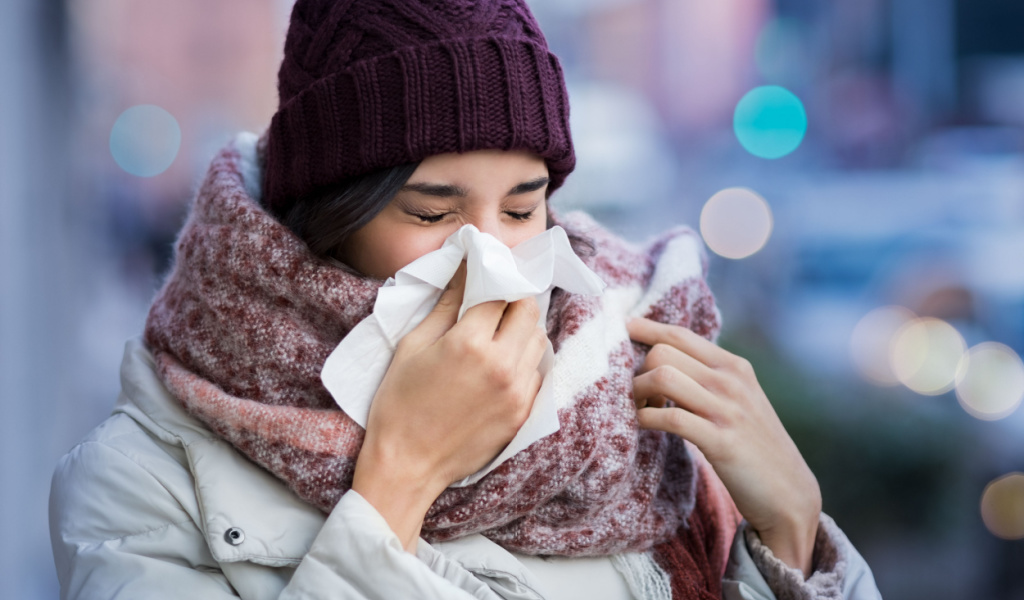With gloomy winter days looming ahead, you’re probably hunkering down with heavy jackets and blankets, gearing up for the “season of coziness.” Unfortunately, winter also brings a host of illnesses and medical challenges that people will have to deal with. Nevertheless, preparing ahead can help you stay on top of your health throughout the winter so you can emerge on the other side in tip-top shape!

Common Health Challenges People Face in Winter
Winter brings along cold winds and wet days, which are breeding grounds for various flus and viruses. Exposure to cold weather can also cause allergic reactions in people, which causes viruses to spread quickly. Here are some of the most common medical issues that people face in winter:
Common Cold & Flu
Wintery weather causes an uptick in contagious cases of flu and viruses, making people more susceptible to the common cold and flu. People also spend more time indoors with closed doors and windows, providing a better breeding ground for viruses and bacteria. You may experience a runny or stuffy nose, cough, sore throat, sneezing, fever, body pain, and headaches.
Respiratory Issues
The cold weather exacerbates respiratory conditions such as asthma, sinusitis, wheezing, etc.. People allergic to dust, mites, mold, and pet dander may find it particularly challenging to get through winter. They may experience chronic cough, shortness of breath, and extreme tiredness, among other breathing-related issues.
Itchy Skin
Dry winter weather can cause your body to dry out, and skin-related issues such as rough and flaky skin, acne, chapped lips, and cracked heels become much more prevalent. Since your body doesn’t sweat as much, there is insufficient production of natural oils that act as a moisturizer, leading to itchy and dry skin.
Vitamin D Deficiency
People spend a lot less time outdoors in the winter, and even when they do, they are usually bundled up and covered from head to toe. Since there is much less exposure to the sun, vitamin D deficiency is a common issue that comes up during winter. Vitamin D deficiencies can result in fatigue, hair loss, muscle and bone weakness, loss of appetite, sleeping issues, mental health problems, etc. Vitamin deficiencies can also cause a weakening of the immune system, making you more vulnerable to illnesses.
Joint Pain
Winter can also cause the heightening of symptoms in people who have arthritis. Even those without the illness can feel discomfort and stiffening in their joints, caused by the thickening of a protective substance present within the joint, called the synovial fluid, that occurs during cold weather season.
Mental Health Issues
Gloomy days and being stuck at home aren’t exactly a good recipe for sound mental health, and some people are more likely to experience seasonal depression. While this should only last for a short period, you may consult a professional if it lasts longer.
Weight Gain
Most people tend to get little to no physical activity during the winter months, which can inadvertently lead to them putting on some extra pounds. Cold weather also makes people lazy, causing them to sleep in or spend more time resting. They are also more likely to binge eat unhealthy foods due to boredom!

Tips to Stay Healthy During Winter
Now that you know what to look out for in winter, you can prepare yourself mentally and physically to get through the season without harming your health. Here are some ways to stay healthy during winter:
Exercise Everyday
Since there is reduced physical activity during the winter months, it’s up to you to consciously move your body every day. You can do so by setting aside 20-30 minutes daily for exercise. You don’t need to go to the gym to exercise, either – there are plenty of workout routines on the internet that can help you exercise at home with minimal or no equipment!
Eat Healthy Foods
One of the most efficient ways to maintain a healthy body is to ensure that what you put into it is nutritious and wholesome. You should be mindful of your diet during all the seasons, but you may need to be extra careful around the winter months not to slip up. Include plenty of whole fruits and vegetables in your diet, and don’t forget to get an extra dose of vitamin D-rich foods like mushrooms, milk, egg yolks, and red meat!
Vaccinations
Pre-winter is the best time for you and your family to catch up on annual vaccinations. Winter is known as the cold season for an excellent reason, so make sure your immune system is prepared to handle the contagious viruses and bacteria floating around in the air. You may also consider taking supplements if you have any deficiencies, but be sure to consult a medical professional before doing so.
Dress Appropriately
Take care of how you dress during winter, especially for outdoor activities, to protect yourself from the harsh cold and windy weather. Layer with woolen clothes and stay warm. Stock up on winter boots, jackets, caps, and gloves to stay cozy and protected!
Stay Hydrated
Since people sweat less and are less tired during winter, they tend to consume less water throughout the day. However, it is essential to stay hydrated even during cold weather because your body needs a good amount of water to perform essential functions. So, make sure to drink at least eight glasses of water during the day. You can set notifications on your phone or download an app that reminds you to drink water to help you stay on track.
Practice Good Hygiene
You might feel like you do not need to bathe as often because you sweat less in cold weather. But it’s crucial to continue practicing good hygiene in winter. Along with bathing every day, you should wash your hands before and after a meal and after you return home from outside. Sanitizing common areas is also an excellent way to prevent the spread of contagious diseases!
Take Care of Your Skin & Hair
Loss of moisture in your skin and hair can cause many problems, so paying attention to them in your daily self-care routine is essential. Moisturize your face and body daily, including common problem areas such as the lips and heels. As for your hair, you can use oil before shampooing for added benefit. Avoid using excessive heat or blow-drying your hair too often because it can cause hair damage!
Maintain Proper Sleeping Habits
Cold weather can disrupt your sleeping cycles. Since it stays darker longer, you may be more tempted to sleep in. On the other hand, people may find it harder to sleep due to cold weather, causing them to stay up longer at night and affecting their sleep quality. Either way, it will disrupt your body’s rhythm and affect your daily activities, sometimes even negatively impacting your mental health.



